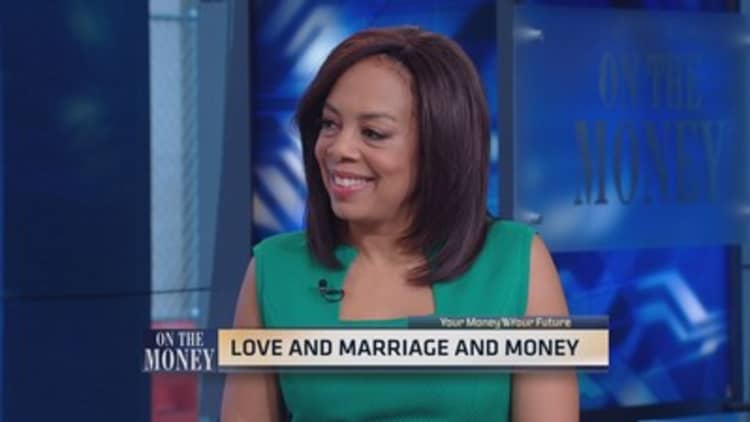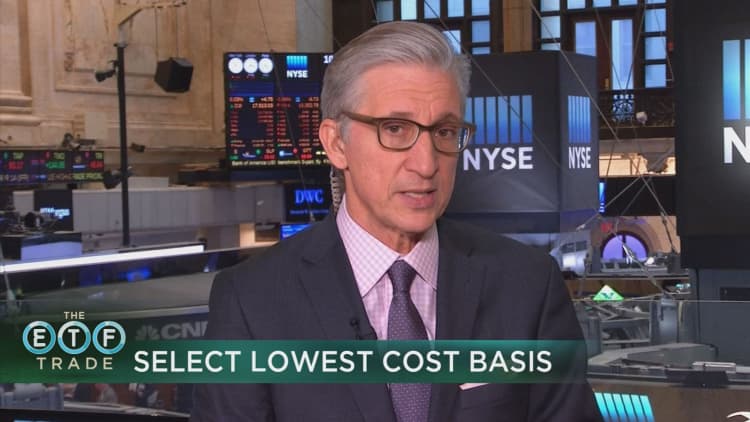


This election year there's no shortage of advocates for simplifying the tax code — or even gutting the IRS, putting pressure on the $20 billion consumer tax prep industry.
On Wednesday, Sen. Elizabeth Warren, D-Mass., introduced a bill that would overhaul the tax system and create a free, online tax-prep and filing system seen as a threat to Intuit's TurboTax do-it-yourself software and tax-prep giant H&R Block. Democratic presidential candidate and Sen. Bernie Sanders of Vermont is one of the co-sponsors of the measure, which is known as the Tax Filing Simplification Act of 2016.
Earlier, GOP presidential candidates Donald Trump and Ted Cruz proposed plans to simplify the tax code — and the latter even talked about abolishing the IRS and letting "taxes become so simple that they can be filled out on a postcard." Rep. Kevin Brady, chairman of the House Ways and Means Committee, told CNBC recently tax reform is "inevitable."
"While shares of H&R Block have reached the level at which they appear interesting from a valuation standpoint after a decline of almost 33 percent since November 2, we believe the political threats facing the company may continue to weigh on the stock until they are resolved," BTIG analyst Mark Palmer said in a research note Wednesday commenting on the Warren tax overhaul bill and Cruz's simple flat-tax plan.
It also hasn't helped that some of H&R Block's peers in the tax-prep space are offering what's known as tax refund anticipation loans (or RALs), which are sometimes marketed as "instant" tax refunds. The RALs had had gone away for several years after some state attorneys general and regulators had criticized them as predatory lending. The RALs are particularly popular for lower-income families and those without bank accounts, a key customer base for tax-prep firms such as H&R Block.
"These are loans in which consumers will pay 20 percent of their tax refund in order to get their proceeds three weeks earlier in some cases," Palmer said in an interview. "If you look at the APR (annual percentage rate) on that kind of transaction, it's extortion. But what you see is some of H&R Block's competitors are offering these and H&R Block is not so that they are at a disadvantage."
H&R Block declined comment for this story.
Shares of Liberty Tax, a competitor of H&R Block, are down about 25 percent year to date through Wednesday — and Blucora, a provider of the do-it-yourself TaxACT software, is off more than 40 percent in the same stretch.
Yet, Intuit appears to be a winner so far this tax season with more Americans opting for self-prep e-filing — and its stock is holding up better, too. Intuit shares are up 7 percent for the year through Wednesday, beating the S&P 500's 1.8 percent advance.
"The first few updates that were provided show Intuit is gaining share really at everybody else's expense," said Wedbush Securities analyst Gil Luria, who covers Intuit and H&R Block. "They've convinced a lot of people to switch from going to a tax store to doing taxes by themselves."
With this year's April 18 tax filing deadline around the corner, the IRS's latest data show a 2.3 percent increase in self-prep e-filers (good proxy of consumer tax software demand) through April 8 compared with a year ago. At the same time, the number of professional e-filers (CPAs and tax stores) is down by 5 percent.
Still, the tax preparation business is growing at about 1 percent to 2 percent per year on average, or roughly the rate of the nation's gross domestic product, according to Palmer. Some saw the potential for tax-prep volumes to accelerate this year with the Affordable Care Act adding complexity to the tax-filing process.
"There was some enthusiasm associated with a potential increase in tax preparation volumes associated with the tax-related provisions of Obamacare," said Palmer. "And while they have to some extent, I don't think it's the extent that many investors had hoped for."
Obamacare "actually has increased prices because less people have simple filings because of the Affordable Care Act," Luria said. "So less people can spend $100 doing their taxes — and more people need to spend $150 or $200. So the Affordable Care Act has actually helped H&R Block. It's just that the volume declines have been greater than the price benefits from the ACA."
Nationwide, the average tax return preparation fee for typical individual tax returns in 2015 was $273, nearly 5 percent higher than 2014, according to a survey by the National Society of Accountants. The cost of tax-prep services in the Pacific region — California, Oregon, Washington, Hawaii and Alaska — was on average about one-quarter more than the national average.
Intuit expects roughly 150 million returns to be filed this tax season in the U.S., and of the total it said about 60 million will be prepared with DIY software. Of the people who filed federal taxes last year using software, Intuit had a commanding 62 percent share of the market. The Mountain View, California-based software company plans to release end-of-season TurboTax results later this month, after the tax filing deadline.
The mobile tax prep app category is seeing strong growth within the DIY tax-prep business, and tech-savvy millennials are leading the way. There are a number of mobile tax-prep apps on the market today, including apps from TurboTax, TaxACT and H&R Block.
"We are continuing to see growth in mobile," Intuit spokeswoman Diane Carlini said in an email response to an inquiry. "Last tax season, TurboTax saw a 9x growth in mobile use and 40 percent of TurboTax customers touched mobile at some point in the tax-prep process. We know that many Millennials are using mobile to do their taxes since they prefer to consume information on mobile. They are not afraid to complete financial tasks using their phones and actually prefer it to opening up a computer, that's not instant enough."
Through April 8, the IRS indicated there were a total of 98.7 million e-filers, down slightly from about 100.8 million in the period last year. In fiscal 2015, the IRS collected more than $3.3 trillion in taxes and processed more than 243 million tax returns and other forms, issuing just over $400 billion in tax refunds. The agency's latest figures show the amount of money processed and refunded in taxes so far is $228 billion, down nearly 1 percent from a year earlier and something analysts say may be a sign the federal tax agency is using more complex fraud filters this tax season.
Meanwhile, new research shows tax rebates may have a bigger role in a family's finances than some might believe.
"The process of filing a tax return is only half the stress," a blog published Wednesday by JPMorgan Chase Institute said. "The actual financial transaction of receiving a tax refund or making a tax payment is often the single largest financial transaction families experience in a given year and a significant contributor to financial volatility."
JPMorgan also said the rapid growth of the shared economy and new labor opportunities such as Uber and TaskRabbit will "add further complications" as they "do not typically withhold taxes from take-home pay. As a result, more lower- and middle-income individuals might find that they have to make tax payments and might even owe tax underpayment penalities."



